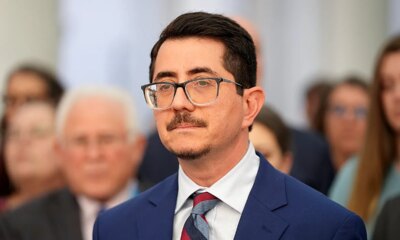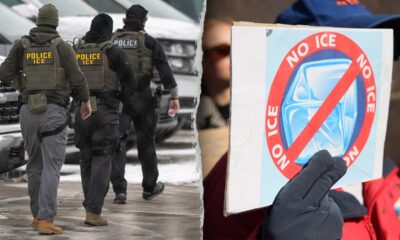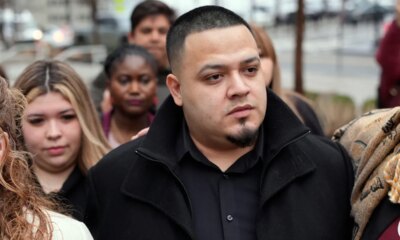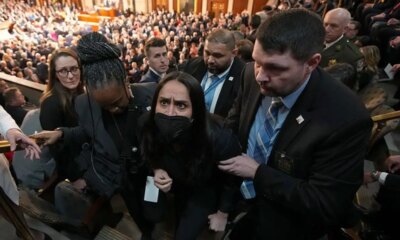South Dakota
Governor to make call on immigration sanctuary cities ban after House passage • South Dakota Searchlight

A bill barring cities, counties or schools from acting as safe havens for undocumented immigrants in South Dakota is headed to the governor’s desk after a 62-6 vote in the state House of Representatives.
Lawmakers are considering several bills this legislative session dealing with immigration. Senate Bill 7, the first of those bills to pass both chambers, would prohibit the state and its political subdivisions from adopting any policy to prevent local law enforcement from cooperating with federal immigration authorities or disciplining officers who do.
There are no South Dakota cities or counties where police or sheriff’s deputies have refused to work with U.S. Immigration and Customs Enforcement (ICE), according to the bill’s sponsor, Rep. Mary Fitzgerald, R-Spearfish.
“Potentially, if we didn’t pass this legislation, maybe we would,” Fitzgerald said in response to a question from Rep. Kadyn Wittman, D-Sioux Falls. “This is really a proactive bill, a proactive step toward making our state safe.”
Noem calls deportation protection for Venezuelans ‘contrary to the national interest’
The bill is meant in part as a statement of support on the state level for the immigration law enforcement actions undertaken by the Trump administration, Fitzgerald said.
“President Trump vowed to make America safe again, and as we’ve seen since January 20, he is living up to that promise with thousands of arrests and ICE detainers,” she said. “The South Dakota Legislature is not in charge of border security, but we are affected by the criminals who have entered the United States illegally.”
Wittman voted against the bill. There’s no need to address an issue if it doesn’t exist, she argued, but there could be unintended consequences. Migrant victims of domestic violence may be less likely to call for help for fear of detention, she said, and a statement of support for federal raids will serve to sour relationships between migrants and the members of law enforcement who may need their help investigating criminal activity.
The bill’s easy passage through the House – it cleared the House Local Government committee 12-1, with Wittman the lone opponent – follows an even smoother trajectory in the Senate. The upper chamber placed SB 7 on its consent calendar, passing it unanimously and with no debate alongside three other uncontested bills.
Gov. Rhoden’s office did not immediately respond to a question on whether he’ll sign SB 7.
Two other proposals tied to immigration advanced Monday, as well.
The Senate sent legislation to the House that would add language to state law and the state constitution saying it’s illegal for noncitizens to vote in South Dakota elections.
Federal law already says only U.S. citizens may vote in federal elections. But Sen John Carley, R-Piedmont, said there is nothing in state law specifying that a person must be a U.S. citizen to vote in South Dakota elections.
“We have always just assumed this is required,” Carley said.
His bill contains language to that effect and would also make voting by noncitizens a felony punishable by up to two years in prison and a $4,000 fine.
The other bill, from Sen. Taffy Howard, R-Rapid City, would ask voters to put similar language in the state constitution on Election Day in 2026. The constitution can only be amended by voters.
Asked by South Dakota Searchlight if the bills are redundant, Carley said his bill is needed to put a law in place with a penalty now while the Legislature waits to see if the ballot measure wins approval later.
Carley said the two bills are part of a “trifecta of safeguards” against noncitizens voting. The third bill, from Sen. Amber Hulse, R-Hot Springs, would require driver’s licenses and identification cards to indicate whether the licensee is a U.S. citizen. Identification is required to cast a ballot in South Dakota.
The Senate sent that bill to the House last week.
GET THE MORNING HEADLINES.

South Dakota
SD Lottery Powerball, Lotto America winning numbers for March 2, 2026
The South Dakota Lottery offers multiple draw games for those aiming to win big.
Here’s a look at March 2, 2026, results for each game:
Winning Powerball numbers from March 2 drawing
02-17-18-38-62, Powerball: 20, Power Play: 2
Check Powerball payouts and previous drawings here.
Winning Lotto America numbers from March 2 drawing
03-08-17-24-34, Star Ball: 06, ASB: 02
Check Lotto America payouts and previous drawings here.
Winning Millionaire for Life numbers from March 2 drawing
28-41-42-50-55, Bonus: 02
Check Millionaire for Life payouts and previous drawings here.
Feeling lucky? Explore the latest lottery news & results
Are you a winner? Here’s how to claim your prize
- Prizes of $100 or less: Can be claimed at any South Dakota Lottery retailer.
- Prizes of $101 or more: Must be claimed from the Lottery. By mail, send a claim form and a signed winning ticket to the Lottery at 711 E. Wells Avenue, Pierre, SD 57501.
- Any jackpot-winning ticket for Dakota Cash or Lotto America, top prize-winning ticket for Lucky for Life, or for the second prizes for Powerball and Mega Millions must be presented in person at a Lottery office. A jackpot-winning Powerball or Mega Millions ticket must be presented in person at the Lottery office in Pierre.
When are the South Dakota Lottery drawings held?
- Powerball: 9:59 p.m. CT on Monday, Wednesday, and Saturday.
- Mega Millions: 10 p.m. CT on Tuesday and Friday.
- Lucky for Life: 9:38 p.m. CT daily.
- Lotto America: 9:15 p.m. CT on Monday, Wednesday and Saturday.
- Dakota Cash: 9 p.m. CT on Wednesday and Saturday.
- Millionaire for Life: 10:15 p.m. CT daily.
This results page was generated automatically using information from TinBu and a template written and reviewed by a South Dakota editor. You can send feedback using this form.
South Dakota
How South Dakota officials have reacted to ‘massive’ US attack on Iran
Hegseth on Iran: ‘This is not Iraq. This is not endless.’
Secretary of War Pete Hegseth said operations on Iran won’t be “endless” like Iraq.
South Dakota’s Congressional leaders are praising President Donald Trump for his action of joining Israel for a missile-launched attack this weekend in Iran, with the intent to target and dismantle Iran’s nuclear capabilities and demand regime change.
“Our objective is to defend the American people by eliminating imminent threats from the Iranian regime, a vicious group of very hard, terrible people,” Trump said Saturday, Feb. 28, calling the strikes, “a massive and ongoing operation.”
Trump has since faced scrutiny for a lack of clarity about the timeline and overall goals of the war, and acting without the direct approval of Congress, which has the power to officially declare war for the U.S. Lawmakers are also in heated debate about whether the Trump’s decision may violate the Constitution, with Democrats calling for a war powers resolution vote to stop the effort, according to multiple military outlets.
Ayatollah Ali Khamenei, Iran’s supreme leader, was directly targeted, a Middle Eastern official told USA TODAY. Khamenei was killed in the attacks on Feb. 28, according to Israeli sources who told USA TODAY, CNN and Reuters. He was 86 and had led Iran since 1989.
Iran retaliated with drone and missile strikes, hitting American and Israeli targets, including a U.S. Naval base in Bahrain. Iran said its enemies would be “decisively defeated.”
At least four Americans and an estimated 200 other individuals have been killed, and an estimated 700 injured as of March 2.
President Trump said he expects more to come.
Here’s what South Dakota Congressional leaders, along with former South Dakota Gov. Kristi Noem, who now sits at the helm of the Department of Homeland Security as secretary, have to say about what has been named by the administration as Operation Epic Fury.
U.S. Senate Majority Leader John Thune
“For years, Iran’s relentless nuclear ambitions, its expanded ballistic missile inventory and its unwavering support for terror groups in the region have posed a clear and unacceptable threat to U.S. servicemembers, citizens in the region, and many of our allies,” said Thune, a Republican, the morning of Feb. 28 in a comment from his office.
“Despite the dogged efforts of the president and his administration, the Iranian regime has refused the diplomatic off-ramps that would peacefully resolve these national security concerns. I commend President Trump for taking action to thwart these threats,” Thune said, thanking Secretary Rubio for providing updates on these issues throughout the week.
“I look forward to administration officials briefing all senators about these military operations,” he said. “I commend the bravery of the servicemembers carrying out these operations and pray for the safety of those in harm’s way.”
U.S. Sen. Mike Rounds
Rounds, a Republican, said Trump took “the right course of action” when handling the strike.
Rounds later congratulated the United States military and Trump on the death of the Iranian leader, stating the moment “offers a path for a more peaceful Middle East.”
U.S. Rep. Dusty Johnson
Johnson, a Republican and the lone U.S. representative for South Dakota, stated the Iranian regime “is full of theocratic thugs and is the world’s largest state sponsor of terror.” He said Trump had given multiple opportunities to change direction.
“I’m praying for the safety of America’s servicemembers, and our allies involved in Operation Epic Fury,” Johnson stated on social media.
DHS Secretary Kristi Noem
Noem, who left her governorship after she was appointed secretary at the beginning of Trump’s current term, took to social media as well, stating she was actively monitoring any potential threats against America.
“I am in direct coordination with our federal intelligence and law enforcement partners,” she said.
South Dakota
SD Lottery Millionaire for Life winning numbers for March 1, 2026
The South Dakota Lottery offers multiple draw games for those aiming to win big.
Here’s a look at March 1, 2026, results for each game:
Winning Millionaire for Life numbers from March 1 drawing
10-11-12-35-56, Bonus: 04
Check Millionaire for Life payouts and previous drawings here.
Feeling lucky? Explore the latest lottery news & results
Are you a winner? Here’s how to claim your prize
- Prizes of $100 or less: Can be claimed at any South Dakota Lottery retailer.
- Prizes of $101 or more: Must be claimed from the Lottery. By mail, send a claim form and a signed winning ticket to the Lottery at 711 E. Wells Avenue, Pierre, SD 57501.
- Any jackpot-winning ticket for Dakota Cash or Lotto America, top prize-winning ticket for Lucky for Life, or for the second prizes for Powerball and Mega Millions must be presented in person at a Lottery office. A jackpot-winning Powerball or Mega Millions ticket must be presented in person at the Lottery office in Pierre.
When are the South Dakota Lottery drawings held?
- Powerball: 9:59 p.m. CT on Monday, Wednesday, and Saturday.
- Mega Millions: 10 p.m. CT on Tuesday and Friday.
- Lucky for Life: 9:38 p.m. CT daily.
- Lotto America: 9:15 p.m. CT on Monday, Wednesday and Saturday.
- Dakota Cash: 9 p.m. CT on Wednesday and Saturday.
- Millionaire for Life: 10:15 p.m. CT daily.
This results page was generated automatically using information from TinBu and a template written and reviewed by a South Dakota editor. You can send feedback using this form.
-

 World6 days ago
World6 days agoExclusive: DeepSeek withholds latest AI model from US chipmakers including Nvidia, sources say
-

 Massachusetts6 days ago
Massachusetts6 days agoMother and daughter injured in Taunton house explosion
-

 Denver, CO6 days ago
Denver, CO6 days ago10 acres charred, 5 injured in Thornton grass fire, evacuation orders lifted
-

 Louisiana1 week ago
Louisiana1 week agoWildfire near Gum Swamp Road in Livingston Parish now under control; more than 200 acres burned
-

 Oregon4 days ago
Oregon4 days ago2026 OSAA Oregon Wrestling State Championship Results And Brackets – FloWrestling
-

 Florida2 days ago
Florida2 days agoFlorida man rescued after being stuck in shoulder-deep mud for days
-

 Technology1 week ago
Technology1 week agoArturia’s FX Collection 6 adds two new effects and a $99 intro version
-

 News1 week ago
News1 week agoVideo: How Lunar New Year Traditions Take Root Across America
























